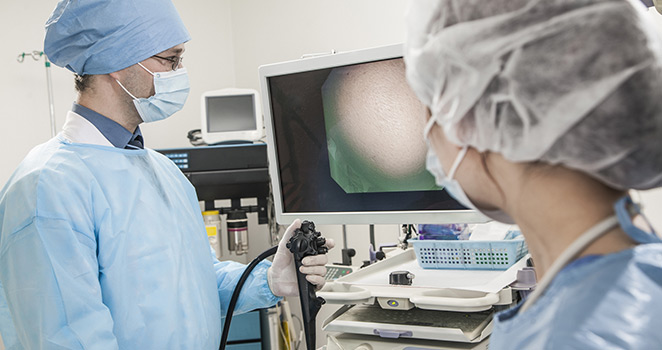Atrium Health Navicent Gastroenterology
General Gastroenterology and Endoscopy

Gastroenterology is a specialty in medicine, which focuses on the digestive system and its disorders. Many different diseases are included in this specialty. The gastrointestinal tract spans from the mouth to the anus. It encompasses the study of the normal function and specific diseases of the esophagus, stomach, small and large intestines, pancreas, gallbladder, liver, and rectum. It also includes the most common and important conditions such as hepatitis, colon polyps, gastroesophageal reflux disease (GERD), irritable bowel syndrome (IBS), cancer, malabsorption issues, and pancreatic issues.
What is a Gastroenterologist?
A gastroenterologist is a physician who has completed dedicated training in the management of diseases that affect the GI tract and liver. After completing eight years of medical education, they then need to perform an addition three-year residency program. Following this, they continue their focus of gastroenterology and endoscopy by completing a gastroenterology fellowship.
Gastrointestinal Endoscopy
Gastrointestinal endoscopic evaluation is recommended for patients suffering from symptoms such as nausea, vomiting, heartburn, and acid reflux. Using an endoscope (fiber optic tube) with a small camera attached to the end, your physician is able to examine your gastrointestinal tract under direct vision.
Upper Endoscopy
An esophagogastroduodenoscopy, also known as an EGD, is a procedure, which involves the insertion of a small scope and camera through the mouth in order to examine the upper digestive tract including the esophagus, stomach, and first part of the small intestine.
EGD's are usually performed on an outpatient basis, but they are also routinely performed in an inpatient setting. Upper endoscopies are performed to identify and treat a number of medical conditions such as upper GI tract bleeding, reflux symptoms and swallowing disorders.
In addition, an upper endoscopy is used to identify the cause of the following gastrointestinal symptoms:
- Nausea and vomiting
- Abnormal chest pressure or pain
- Bleeding
- Swallowing disorders
- Heartburn
- Rule out cancerous growths and/or inflammation of the esophagus.
In addition, many types of abnormalities can be successfully treated through during endoscopic evaluation to include:
- Benign polyps or malignancies are removed by biopsy for identification.
- Removal of foreign objects from the esophagus.
- Dilatation of strictures (narrowed areas of tissue) from the throat or upper GI tract can be performed.
Colonoscopy
A colonoscopy is also performed using an endoscope and camera. This allows your physician to examine the lining of your colon and rectum. Using a thin, flexible tube called a colon scope; he or she is able to identify any abnormalities such as inflammation, bleeding, benign colon polyps, or cancerous growths. Tissues samples are usually taken during a colonoscopy and sent for analysis.
Benefits of General Gastroenterology and Endoscopy
Gastroenterologists are dedicated to diagnosing and treating a wide variety of gastrointestinal maladies. Considered experts in their field, research has shown that gastroenterologists perform higher quality endoscopic examinations compared to other types of physicians. This equates to a higher level of accuracy in the detection and treatment of polyps and/or tumors when performed endoscopically.
What is Your Colorectal Cancer Risk?
Take a quick, free online health assessment to estimate your risk of developing colorectal cancer.